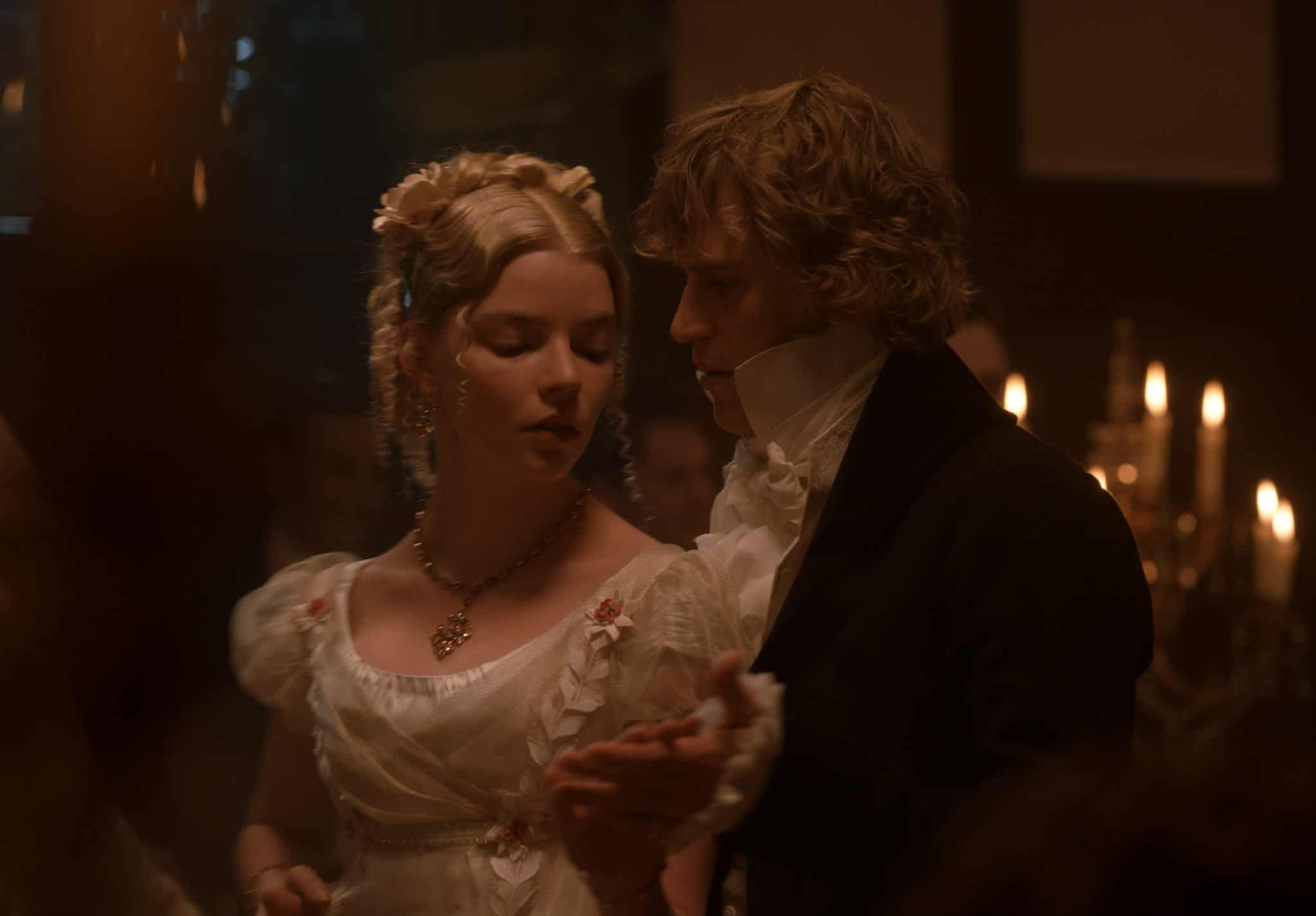
Jane Austen adaptations are hilariously witty period pieces that are always a delight to watch, and Autumn De Wilde‘s Emma. is no exception. Along with luscious costumes and sets, the film brings the posh world of Austen’s fiction to life with tactics more reminiscent of comedies that came long after the author’s death. Elements of screwball comedy are undeniably present in De Wilde’s version, proving just how ahead of her time Austen was.
Emma. centers around Emma Woodhouse (Anya Taylor-Joy), a rich young lady who is more concerned with setting up her friends than she is finding a husband of her own. She makes an orphaned Harriet Smith (Mia Goth) her latest project for matchmaking, but Emma’s foolproof methods for setting up her friends begin to cause more trouble than she anticipates. Her own feelings come into play and the man she thought she would never be interested in, Mr. Knightly (Johnny Flynn), starts looking pretty dashing.
Screwball comedies revolve around mostly the same topics in Emma.: love, sex, and gender roles. The genre’s beginning is mostly credited to It Happened One Night in 1934, but Jean Harlow’s stardom was flourishing on the same characteristics of a spunky screwball woman years before Frank Capra’s Best Picture winner. The key aspects of the genre revolve around quick, witty dialogue where men and women flip the script on society’s gender roles of the time. They cannot stand each other until they realize they’re perfect for each other and an exciting romance ensues.
One of the ways that Emma. upholds these screwball traditions is taking men’s masculinity into question. While scouting for the perfect suitor for her friends, Emma deeply judges the men around her and whether they are fit to be a husband. Mr. Elton (Josh O’Conner) is the source of a lot of laughs in the film, especially when the women around him clearly overpower him. He lacks the charm that the other men in the movie possess, and his inability to keep up with them makes for some quality snickers.
The other men in the film, namely Mr. Knightly and the elusive Frank Churchill (Callum Turner) are in competition with one another to be the most suitable bachelor in this small town. Mr. Knightly shows off his singing talents with the adored Jane Fairfax (Amber Anderson). Mr. Churchill loves engaging in flirty, yet refined conversation with Emma. They show off their grace on the dancefloor. Yet, these men become a little less than bumbling fools in the face of the women they love. Just as in screwball comedies, the way men are expected to act in the society of the film is never how they truly are. Screwball comedies and Emma. transfer that truth into comedy.
A key aspect of screwball comedies and Emma. is a misunderstanding. Beloved movies like Bringing Up Baby draw their ridiculous situations off of characters misunderstanding one another. Emma believes she can devise the perfect plans for matchmaking. She knows everyone’s intentions, who they like, and what to do to get them to fall in love.
None of her plans go as she envisions them and we get fantastic comedy out of watching her learn her lesson. Emma spends her days trying to get Mr. Elton to fall in love with her friend Harriet. She convinces Harriet to turn down a man who proposes to her because she is so sure that Mr. Elton is in love with Harriet. One evening, Emma gets stuck riding in a carriage with Mr. Elton and he confesses his love for Emma, not Harriet. Her plan has gone awry and now everyone looks ridiculous, especially Mr. Elton, as Emma has to turn him down.
The plot only gets more complicated from there. Everyone thinks someone is in love with the wrong person and watching this chaos that Emma has created is delightful. Great comedy can come out of miscommunication. As we love it in screwball comedies like The Lady Eve, we adore the same confusion that happens in Emma., especially since it happens to characters who think they have it all figured out.
One of the most notable couples to have made several screwball comedies together is Fred Astaire and Ginger Rogers. While their films Top Hat and The Gay Divorcee have music and dance, they also have the sex-comedy plots in between dance numbers. Rogers always hates Astaire at the beginning of their films. He’s a no-good dope whom she refuses to take seriously. They bicker incessantly, some of the best romantic comedy dialogue ever. Astaire never lets up on his pursuit of Rogers and that’s when he sweeps her into a glorious dance. From then on, Rogers is enamored and they eventually fall in love.
The same goes for Emma and Mr. Knightly. They hate each other at the beginning of the story. He is one of the only people to see through Emma’s conniving ways. She cannot stand that he thinks she’s wrong in meddling in other people’s lives. They never see eye to eye on anything. However, when they dance together at a party, it’s game over. Emma finally allows herself to see Mr. Knightly in a romantic way. They have to shut up and really look at each other for the first time. It ends up being one of the sexiest scenes without ever showing sex on screen. Thankfully, Mr. Knightly and Emma follow the same fate as Fred and Ginger. They realize they are perfect for each other thanks to the intimacy of dance.
There are many other small moments in De Wilde’s Emma. that feel as silly as screwball comedies, but the main connection is all straight from Austen’s novel. Most of the dialogue is lifted straight from the book, and so those quick-witted one-liners are from long before the first screwball comedy, whichever movie you argue that may be. Austen’s plot deals with the same themes, the same kinds of comedy, and the same wooing tactics as screwball comedies. Perhaps that’s why filmmakers continue to adapt her novels even to this day. They were ahead of their time in terms of how they joked about sex, gender, and marriage, and that continues to connect with audiences 200 years later.
Emma. is in theaters everywhere this week.
Related Topics: Emma, Jane Austen, Screwball Comedies

